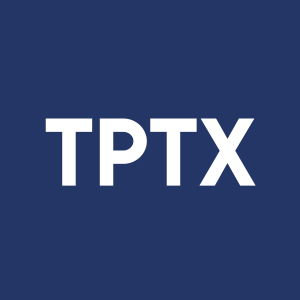Turning Point Therapeutics Presents TRIDENT-1 Study Clinical Data for Repotrectinib in NTRK+ Advanced Solid Tumors in Plenary Session at 2021 AACR-NCI-EORTC Conference
Rhea-AI Summary
Turning Point Therapeutics (TPTX) recently presented early clinical data from its TRIDENT-1 Phase 1/2 study of repotrectinib for NTRK-positive advanced solid tumors. The results show a confirmed objective response rate (cORR) of 48% in TKI-pretreated patients and 41% in TKI-naïve patients. A significant 62% cORR was observed in patients with solvent front mutations. The FDA has granted Breakthrough Therapy designation for repotrectinib in this patient population. The company anticipates a Type B meeting with the FDA in early 2022 to discuss potential registration steps.
Positive
- Confirmed objective response rate of 48% in TKI-pretreated patients.
- Confirmed objective response rate of 62% in patients with solvent front mutations.
- Breakthrough Therapy designation awarded by the FDA for repotrectinib.
Negative
- None.
News Market Reaction – TPTX
On the day this news was published, TPTX gained 2.60%, reflecting a moderate positive market reaction.
Data tracked by StockTitan Argus on the day of publication.
- Confirmed Objective Response Rate of 48 Percent in Patients with NTRK+ TKI-Pretreated Advanced Solid Tumors
- Confirmed Objective Response Rate of 62 Percent in NTRK+ TKI-Pretreated Advanced Solid Tumor Patients with Solvent Front Mutations
- Breakthrough Therapy Designation Recently Granted in Patients with NTRK+ Advanced Solid Tumors Who Have Progressed Following Treatment with 1 or 2 Prior TKIs
- Confirmed Objective Response Rate of 41 Percent in Patients with NTRK+ TKI-Naive Advanced Solid Tumors
SAN DIEGO, Oct. 08, 2021 (GLOBE NEWSWIRE) -- Turning Point Therapeutics, Inc. (NASDAQ: TPTX), a precision oncology company developing next-generation therapies that target genetic drivers of cancer, today announced the presentation of early clinical data from the NTRK-positive TKI-naïve and TKI-pretreated advanced solid tumor cohorts (EXP-5 and EXP-6) of the ongoing TRIDENT-1 Phase 1/2 study of its lead drug candidate repotrectinib.
These data are being presented today at a plenary session at the Virtual International Conference on Molecular Targets and Cancer Therapeutics hosted by the American Association for Cancer Research (AACR), the National Cancer Institute (NCI), and the European Organisation for Research and Treatment of Cancer (EORTC) being held October 7-10.
“These data in patients with NTRK-positive advanced solid tumors are encouraging and support further investigation of repotrectinib in this patient population, especially in the TKI-pretreated setting where there are no currently approved targeted therapies,” said Mohammad Hirmand, M.D., chief medical officer. “Based on these findings and repotrectinib having recently been granted Breakthrough Therapy designation for NTRK-positive TKI-pretreated advanced solid tumors, we look forward to discussing next steps toward potential registration of repotrectinib in this patient population at a Type B meeting with the FDA anticipated in the first half of 2022.”
Repotrectinib Early Data from Phase 1/2 TRIDENT-1 Study from NTRK-Positive Advanced Solid Tumor Cohorts (EXP-5, EXP-6)
The early Phase 2 TRIDENT-1 dataset utilizes an August 26, 2021 data cutoff. The safety analysis includes 301 treated patients from the pooled Phase 1 and Phase 2 portions of TRIDENT-1 across all cohorts, and the preliminary efficacy analysis includes 40 evaluable patients from the pooled Phase 1 and Phase 2 portions of TRIDENT-1 in the NTRK-positive advanced solid tumor cohorts (EXP-5, EXP-6). Of the 40 patients, 17 were TKI-naïve and 23 were TKI-pretreated. Phase 2 patients included in the efficacy analysis had baseline measurable disease and at least one post-baseline evaluable scan or were off treatment prior to first post-baseline scan. Responses were confirmed with a subsequent scan at least 28 days later per RECIST 1.1 and were determined by physician assessment for Phase 2 patients. Phase 1 patients included in the efficacy analysis were treated at or above the Phase 2 dose, with responses assessed by blinded independent central review (BICR). The Phase 1 data cutoff date was July 22, 2019 for responses and August 26, 2021 for duration of treatment.
The findings were reported in a pre-recorded oral plenary presentation by Benjamin Besse, M.D., Ph.D., professor of Medical Oncology at Paris-Saclay University and full-time cancer specialist at Gustave Roussy Cancer Center available on October 8 at 10:05 a.m. ET on the meeting website.
Pooled Phase 1 and Phase 2 Preliminary Efficacy Analysis (n=40)
- In the NTRK-positive TKI-naïve advanced solid tumor population (EXP-5: n=17), the confirmed Objective Response Rate (cORR) was
41% (95% CI: 18-67). At the time of the data cutoff, three patients with limited time on treatment achieved stable disease with tumor regression of -21% , -23% , and -27% on their first post-baseline scans, and were awaiting their next scans. Duration of response ranged from 1.9+ to 7.4+ months, and the duration of treatment in the 17 patients ranged from 0.9 to 30.7+ months. - In the NTRK-positive TKI-pretreated advanced solid tumor population (EXP-6: n=23), the cORR was
48% (95% CI: 27-69). As of the cutoff date, three patients had unconfirmed partial responses (uPRs). Two uPRs have been confirmed since the cutoff date and are included in the cORR; the third patient with a uPR was on treatment awaiting a confirmatory scan and is not considered a responder in the cORR. The48% cORR is an update since the pre-recorded presentation. Duration of response ranged from 0.9+ to 15.1 months, and the duration of treatment in the 23 patients ranged from 0.6 to 20.8 months. - Of the 23 NTRK-positive TKI-pretreated advanced solid tumor patients, 13 (
57% ) had NTRK solvent front mutations. In these 13 patients, the cORR was62% (95% CI: 32-86) including one patient who had a complete response. As of the cutoff date, three patients had unconfirmed partial responses (uPRs). Two uPRs have been confirmed since the cutoff date and are included in the cORR; the third patient with a uPR was on treatment awaiting a confirmatory scan and is not considered a responder in the cORR. The62% cORR is an update since the pre-recorded presentation. Duration of response ranged from 0.9+ to 13.7 months.
Preliminary Safety Analysis (n=301)
- Repotrectinib was generally well tolerated.
- The most frequently reported treatment-emergent adverse event (TEAE) was low-grade dizziness (
60% ) of which76% of reported cases were grade 1. Eleven patients (4% ) reported ataxia in the absence of dizziness. No events of dizziness or ataxia led to treatment discontinuation. - Dose modifications due to TEAEs included
27% of patients who had dose reduction and11% who had drug discontinuation.
Turning Point also announced the publication of preclinical data of repotrectinib in the American Association of Cancer Research’s peer reviewed journal, Molecular Cancer Therapeutics. Preclinical studies described in the publication titled “Molecular Characteristics of Repotrectinib That Enable Potent Inhibition of TRK Fusion Proteins and Resistant Mutations” show that repotrectinib potently inhibited TRK fusion proteins and resistance mutations. Repotrectinib was the most potent inhibitor of wild-type TRKA/B/C fusions and was more potent than selitrectinib against all tested resistance mutations.
Repotrectinib was recently granted Breakthrough Therapy designation for the treatment of patients with advanced solid tumors that have an NTRK gene fusion who have progressed following treatment with one or two prior TRK tyrosine kinase inhibitors, with or without prior chemotherapy, and have no satisfactory alternative treatments. The company is planning to discuss next steps towards potential registration of repotrectinib in this patient population at a Type B meeting with the U.S. Food and Drug Administration (FDA) anticipated in the first half of 2022.
About Turning Point Therapeutics Inc.
Turning Point Therapeutics is a clinical-stage precision oncology company with a pipeline of internally discovered investigational drugs designed to address key limitations of existing cancer therapies. The company’s lead drug candidate, repotrectinib, is a next-generation kinase inhibitor targeting the ROS1 and TRK oncogenic drivers of non-small cell lung cancer and advanced solid tumors. Repotrectinib, which is being studied in a registrational Phase 2 study in adults and a Phase 1/2 study in pediatric patients, has shown antitumor activity and durable responses among kinase inhibitor treatment-naïve and pre-treated patients. The company’s pipeline of drug candidates also includes TPX-0022, targeting MET, CSF1R and SRC, which is being studied in a Phase 1 trial of patients with advanced or metastatic solid tumors harboring genetic alterations in MET; TPX-0046, targeting RET, which is being studied in a Phase 1/2 trial of patients with advanced or metastatic solid tumors harboring genetic alterations in RET; and TPX-0131, a next-generation ALK inhibitor, which is being studied in a Phase 1/2 trial of previously treated patients with ALK-positive advanced or metastatic non-small cell lung cancer. The company is driven to develop therapies that mark a turning point for patients in their cancer treatment. For more information, visit www.tptherapeutics.com.
Forward Looking Statements
Statements contained in this press release regarding matters that are not historical facts are “forward-looking statements” within the meaning of the Private Securities Litigation Reform Act of 1995. Such forward-looking statements include statements regarding, among other things, the efficacy, safety and therapeutic potential of repotrectinib, the results, conduct, progress and timing of the TRIDENT-1 clinical study, plans regarding future regulatory submissions, and the regulatory approval paths for repotrectinib. Because such statements are subject to risks and uncertainties, actual results may differ materially from those expressed or implied by such forward-looking statements. Words such as “plans”, “will”, “believes,” “anticipates,” “expects,” “intends,” “goal,” “potential” and similar expressions are intended to identify forward-looking statements. These forward-looking statements are based upon Turning Point Therapeutics’ current expectations and involve assumptions that may never materialize or may prove to be incorrect. Actual results could differ materially from those anticipated in such forward-looking statements as a result of various risks and uncertainties, which include, without limitation, risks and uncertainties associated with Turning Point Therapeutics’ business in general, risks and uncertainties related to the impact of the COVID-19 pandemic to Turning Point Therapeutics’ business and the other risks described in Turning Point Therapeutics’ filings with the Securities and Exchange Commission (SEC), including its quarterly report on Form 10-Q filed with the SEC on August 9, 2021. All forward-looking statements contained in this press release speak only as of the date on which they were made. Turning Point Therapeutics undertakes no obligation to update such statements to reflect events that occur or circumstances that exist after the date on which they were made.
Contact:
Scott Lipman
ir@tptherapeutics.com
858-876-3985








